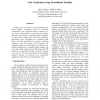Free Online Productivity Tools
i2Speak
i2Symbol
i2OCR
iTex2Img
iWeb2Print
iWeb2Shot
i2Type
iPdf2Split
iPdf2Merge
i2Bopomofo
i2Arabic
i2Style
i2Image
i2PDF
iLatex2Rtf
Sci2ools
WACV
2005
IEEE
2005
IEEE
Gait Verification Using Probabilistic Methods
In this paper we describe a novel method for gait based identity verification based on Bayesian classification. The verification task is reduced to a two class problem (Client or Impostor) with logistic functions constructed to provide probability estimates of intra-class (Client) and inter-class (Impostor) likelihoods. These likelihoods are combined using Bayes rule and thresholded to provide a decision boundary. Since the outputs of the classifier are probabilities they are particularly well suited for use without modification in classifier fusion schemes. On tests using 1664 examples from 100 clients and 100 impostors the Bayesian method achieved an equal error rate of 7.3%. The improvement over a Euclidean distance classifier was shown to be statistically significant at the 5% level using McNemar’s test.
Related Content
| Added | 25 Jun 2010 |
| Updated | 25 Jun 2010 |
| Type | Conference |
| Year | 2005 |
| Where | WACV |
| Authors | Alex I. Bazin, Mark S. Nixon |
Comments (0)

